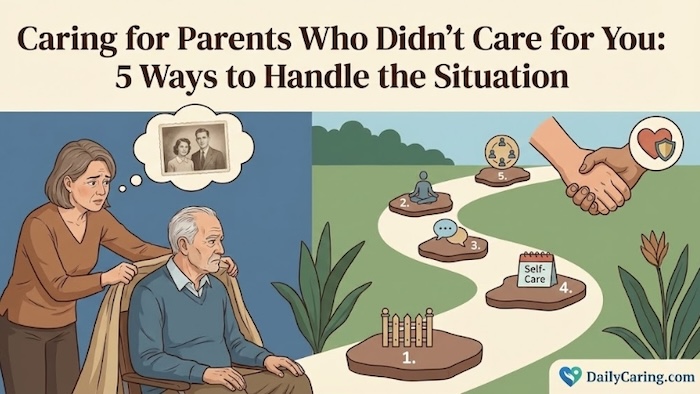Is your sibling too busy to help? Does a family member suddenly go AWOL when your parent needs support? If you're nodding in frustrated recognition, you're not alone. Many primary caregivers find themselves carrying the load while relatives offer a stream of excuses. This imbalance can lead to burnout and resentment, but it doesn't have to be this way.
Let's tackle the three most common excuses head-on with practical, powerful strategies to get the help you need and deserve.

Caregivers Need More Help and Support – Especially From Family Members
Many caregivers take on more responsibility for their older adult than others in their family.
In AARP’s 2020 report, half of all family caregivers said that nobody else provided unpaid care.
Caring for an older adult by yourself can be exhausting and damaging to health. But getting family to help is often a challenge.
Getting a better understanding of why family members aren’t doing their part helps you find ways to get them to participate in caregiving.
We share 3 top reasons why family members don’t help with caregiving and suggest how to overcome their excuses so they’ll give you the help you need and deserve.
3 Reasons Why Relatives Avoid Caregiving
1. They Think You Don’t Need Help
This may sound ridiculous because you’re living the grueling reality of caregiving, but from the outside, it may look like you’ve got everything under control and don’t need help.
Often, people who aren’t involved in day-to-day care have no idea how much time, energy, and sacrifice are needed to care for an older adult.
And telling your family member about everything you do isn’t as effective as having them experience it firsthand.
A good way to start changing their misguided point of view is to involve them in day-to-day activities gradually.
For example, ask your relative to help with a specific task – such as a health insurance claim or financial housekeeping.
Or, arrange their visit for when you’d usually help Mom get ready for bed, and then ask them to do some of the things you would typically do.
They may not change their minds the first couple of times, but if you keep involving them in various aspects of your older adult’s care, they’ll soon see firsthand how much time and energy caregiving really takes.
2. They Don’t Know What to Do
Another type of family member might not know how they help. These folks do better when given specific tasks.
It might not be delightful to have to constantly spell out precisely what you need because it seems so apparent to you, but these people often respond better to requests.
For example, you might say, “Next Saturday, I need your help to declutter Mom’s house so she won’t be as likely to fall. Can you meet me at her house at 2 pm and stay until 5 pm?”
3. They’re Scared of Screwing Up
When you started as a caregiver, you had to jump in and learn on the job.
It might be upsetting to think that someone else has the luxury of sitting on the sidelines because they’re too afraid.
But this person is more likely to help if you slowly ease them into the role and train them in caregiving tasks.
Start by having them shadow you as you care for your older adult. That helps them overcome their fear and become familiar with the routine.
The more firsthand experience they have with caregiving, the more comfortable they’ll become.
As an example, you could ask them to come over for lunch. While they’re there, calmly talk through the ways you’re helping Dad – “I’m just going to cut up the chicken to make it easier to chew,” or “Let’s gently encourage Mom to drink all her juice at lunch so she won’t get dehydrated.”
VIDEO: 3 Excuses You'll Hear to Avoid Caregiving Duties
Final Thoughts About Caregiving Excuses
Remember, shifting from solo caregiving to a family team effort isn't about assigning blame; it's about creating a sustainable support system for you and your loved one. By addressing these excuses with clarity and compassion, you're not being demanding; you're being a strategic leader.
You deserve a circle of support, not a solo burden. So take a deep breath, pick up the phone, and start the conversation. You've got the tools to advocate not just for your loved one, but for yourself.
Recommended for you:
- 3 Effective Ways to Respond to Caregiver Criticism
- 6 Ways to Improve the Situation When Siblings Don’t Help with Aging Parents
- Caregiving with Siblings: 5 Tips for Working Together
About the Author

Connie is the founder of DailyCaring.com and was a hands-on caregiver for her grandmother for 20 years. (Grandma made it to 101 years old!) She knows how challenging, overwhelming, and all-consuming caring for an older adult can be. She also understands the importance of support, especially in the form of practical solutions, valuable resources, and self-care tips.














What if it’s the main caregiver that is being overbearing? Doesn’t know how to back off? Allow the elderly person some space and is acting out a fear scenario goes beyond advocating and is leaning towards controlling? Then you add in the family dynamics where instead of the asking for help, it’s almost a delegation that ignores other family members lives and obligations? What does one do in that scenario?
I had to comment.
My sister has ha my mom for years, but she needed a break after her third and final child, so I let my mum come stay with us while she recovered from the birth .
It was a nightmare, my mum thought she was getting control of our home, money and the right to attempt to turn our routine upside down and the final straw was she wanted to pick up and go to the store when she wanted after my husbands spent a full day working!
She didn’t care about COVID-19 only that she had her soda, ice and cigarettes she is a dry drunk not a sober one and everything was about her habits!
People were dying left and right, but she would not make do with a monthly trip she wanted to go to the store all the time, she can clean and bath herself but wanted to slouch around in grungy clothes and not bath.
I insisted on twice weekly shows and washing her clothes weekly mom thought she was entitled to being a slob and smoking too close to the house No.
Look I helped my sister as she needed help, for respite. but I am never moving anyone in again they think you are the housekeeper, and they can yell and scream at you when they feel bad about anything.
Do not move in with them or move them in with you, instead oversee their care from a distance, otherwise they will try to make your home a twenty-four hour a day work house.
Where you are toiling away because they imagine they have rights to bully you, because they are old and need care.
My mother is disabled, but she was not unable to care for herself, she just thought it was ok to be sloppy and sweaty because she was comfortable to hell with everyone else comfort.
It is hard to help people who do not want to care about how helping them affects you. Some elders do not admit they think of carer as a tool to be used and abused and get angry when you assert limits as human.
So sorry to hear that your mom has been behaving this way 🙁 It’s a major challenge to care for someone who doesn’t respect that you have needs as well.
I’ve been with my mom about ten or more years. I have 4 brothers I’m the only daughter have one brother who tries to help me 1 lives in the states , one lives with me but not much help and the oldest worries more about he’s mother in law then his mom.I work so I can kept up with the financial.
What you’re doing for your mom is amazing. It’s good that you have one brother who at least tries to help. I’m sorry that the others aren’t doing their part 🙁
In case it helps with the finances, here are a couple articles that may have useful information about benefits:
— Benefits Programs Help Pay for Caregiving Expenses https://dailycaring.com/financial-help-caregiving-expenses/
— 3 Ways of Getting Paid as a Family Caregiver: Government Benefits Programs https://dailycaring.com/financial-help-caregiving-expenses/
My siblings become so sad and upset by the changes in our parents. They are kind of unstable in their own lives, and it is just too much for them to handle. It is frustrating to me.
I’m so sorry you’re in this situation 🙁 It’s tough to shoulder the responsibility alone. Would they be able to contribute financially so you can hire some help? Or, maybe they could help with non-care tasks like errands.
I don’t actually related to the excuses outlined in this article. In my experience, my siblings’s reasons/excuses have always been: 1. I don’t have time; 2. I have a life; 3. I can’t do what you do. While they “appreciate” what I do, they always seem to have “plans,” and don’t want to “give up their own life.”
One thing I’ve said to them is “you make plans because you can.” I can’t walk away.
I’m so sorry your siblings have been unwiling to help, that’s a very disappointing situation to be in. Maybe you could get them to contribute financially if they refuse to help in other ways?
Hi
For me it simple,I have a brother who dose not want to be part of it and has clearly said so.
He was not raised that way.
I am in alot of pain myself and I have been at this for over 35 yrs.
Also I think and feel it is sad he doesn’t see them,they will not be here forever.
In short it is sad,heart breaking and disheartening.
Maria — I’m so sorry about your brother 🙁 I hope you’re able to get help with caregiving from other sources so you can have time to care for yourself as well ❤
All of these stories are so true. I have 2 brothers, 1 we don’t hear from and the other is pretty responsive. But we are in different states. The bottom line for me is I will do as much as I can for as long as I can. My mother has always been there for her family and didn’t bail if it got to hard. My sadness comes from the fact that she won’t be here for ever and my siblings are missing so much. Their loss.
I’m so glad you’re able to be there for your parents ❤❤
I have 12 brothers and sisters our mother began needing help last September I stay with mom over night at her house she comes home with me in the mornings so i can run child day care i only have one sister that will stay overnight and she only does that one or if iam lucky two nights a month they help with a few dr app but that is it i never get to see my own family and i am beyond tired atleast six out of the 12 have done nothing but they tell me i have plenty of help i really don’t have family support
I’m so sorry that’s happening 🙁 If your siblings aren’t willing to physically help, you could ask them to contribute financially so you can hire some help and get some well-deserved breaks.